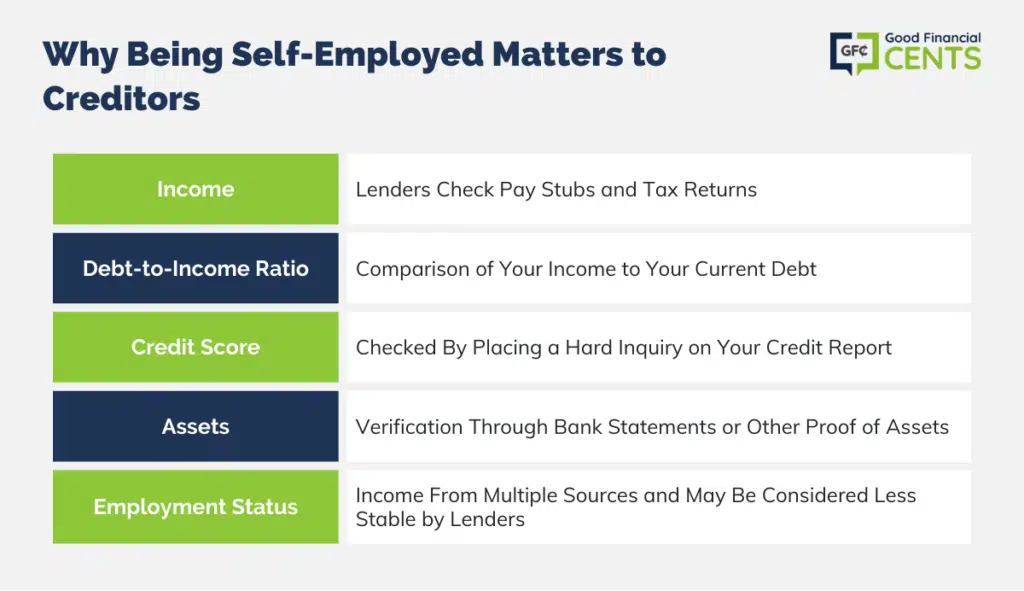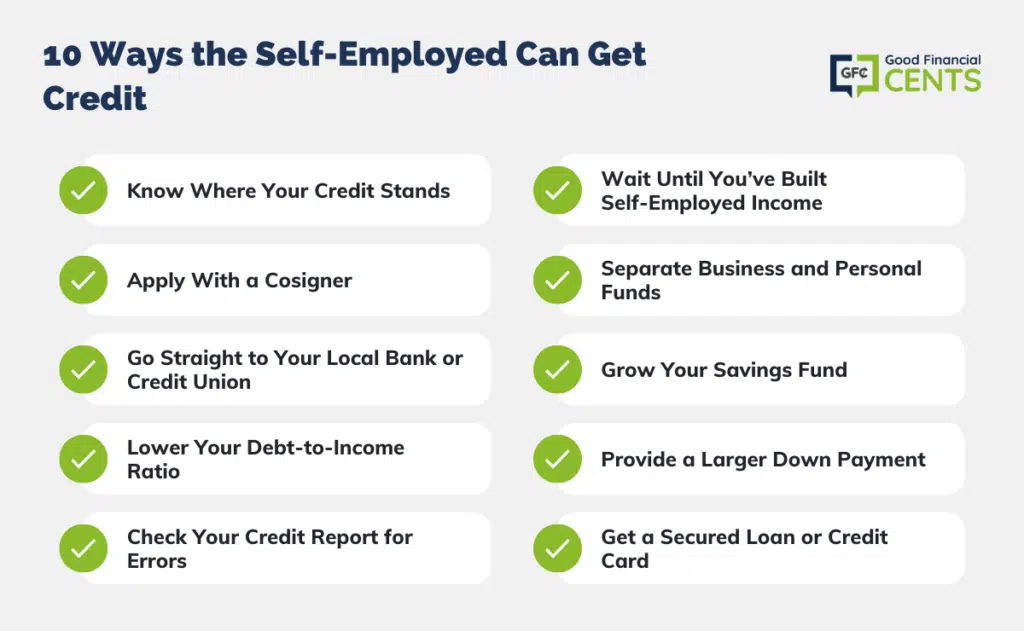Around 10.1% of employed Americans worked for themselves in 2023, yet the ranks of the self-employed might increase among certain professions more than others. By 2026, the U.S. Bureau of Labor Statistics projects that self-employment will rise by nearly 8%.
Some self-employed professionals experience high pay in addition to increased flexibility. Dentists, for example, are commonly self-employed, yet they earned a median annual wage of $163,220 in 2021.
Conversely, appraisers and assessors of real estate, another career where self-employment is common, earned a median annual wage of $61,340 in 2021.
When you work for yourself, you might have to jump through additional hoops to qualify for credit.
Despite high pay and job security in some industries, there’s one area where self-employed workers can struggle — qualifying for credit.
When you work for yourself, you might have to jump through additional hoops and provide a longer work history to get approved for a mortgage, take out a car loan, or qualify for another line of credit you need.
Table of Contents
Why Being Self-Employed Matters to Creditors
Here’s The Good News:
When applying for a mortgage or another type of loan, lenders consider the following criteria:
- Your income
- Debt-to-income ratio
- Credit score
- Assets
- Employment status
Generally speaking, lenders will confirm your income by looking at pay stubs and tax returns you submit.
They can check your credit score with the credit bureaus by placing a hard inquiry on your credit report and can confirm your debt-to-income ratio by comparing your income to the debt you currently owe.
Lenders can also check to see what assets you have, either by receiving copies of your bank statements or other proof of assets.
After all, bringing in unpredictable streams of income from multiple sources is considerably different than earning a single paycheck from one employer who pays you a salary or a set hourly rate.
If your income fluctuates or your self-employment income is seasonal, this might be considered less stable and slightly risky for lenders.
That said, being honest about your employment and other information when you apply for a loan will work out better for you overall.
Most lenders will ask about the status of your employment in your loan application; however, your self-employed status could already be listed with the credit bureaus. Either way, being dishonest on a credit application is a surefire way to make sure you’re denied.

Extra Steps to Get Approved for Self-Employed Workers
When you apply for a mortgage and you’re self-employed, you typically have to provide more proof of a reliable income source than the average person.
Lenders are looking for proof of income stability, the location and nature of your work, the strength of your business, and the long-term viability of your business.
To prove your self-employed status won’t hurt your ability to repay your loan, you’ll have to supply the following additional information:
- Two years of personal tax returns;
- Two years of business tax returns;
- Documentation of your self-employed status, including a client list if asked; and
- Documentation of your business status, including business insurance or a business license.
Applying for another line of credit, like a credit card or a car loan, is considerably less intensive than applying for a mortgage — this is true whether you’re self-employed or not.
Most other types of credit require you to fill out a loan application that includes your personal information, your Social Security number, information on other debt you have like a housing payment, and details on your employment status.
If your credit score and income are high enough, you might get approved for other types of credit without jumping through any additional hoops.
10 Ways the Self-Employed Can Get Credit
If you work for yourself and want to make sure you qualify for the credit you need, there are plenty of steps you can take to set yourself up for success. Consider making the following moves right away.
1. Know Where Your Credit Stands
You can’t work on your credit if you don’t even know where you stand. To start the process, you should absolutely check your credit score to see whether it needs work. Fortunately, there are a few ways to check your FICO credit score online and for free.
2. Apply With a Cosigner
If your credit score or income is insufficient to qualify for credit on your own, you can also apply for a loan with a cosigner. With a cosigner, you get the benefit of relying on their strong credit score and positive credit history to boost your chances of approval.
If you choose this option, however, keep in mind that your cosigner is jointly responsible for repaying the loan if you default.
3. Go Straight to Your Local Bank or Credit Union
If you have a long-standing relationship with a credit union or a local bank, you already have a general understanding of how you manage money. With this trust established, it might be willing to extend you a line of credit when other lenders won’t.
This is especially true if you’ve had a deposit account relationship with the institution for several years at minimum. Either way, it’s always a good idea to check with your existing bank or credit union when applying for a mortgage, a car loan, or another line of credit.
4. Lower Your Debt-to-Income Ratio
The debt-to-income (DTI) ratio is an important factor lenders consider when you apply for a mortgage or another type of loan. This factor represents the amount of debt you have compared to your income, and it’s represented as a percentage.
If you have a gross income of $6,000 per month and you have fixed expenses of $3,000 per month, for example, then your DTI ratio is 50%.
A DTI ratio that’s too high might make it difficult to qualify for a mortgage or another line of credit when you’re self-employed. For mortgage qualifications, most lenders prefer to loan money to consumers with a DTI ratio of 43% or lower.
5. Check Your Credit Report for Errors
To keep your credit in the best shape possible, check your credit reports regularly. You can request your credit reports from all three credit bureaus once every 12 months, for free, at AnnualCreditReport.com.
If you find errors on your credit report, take steps to dispute them right away. Correcting errors on your report can give your score the noticeable boost it needs.
6. Wait Until You’ve Built Self-Employed Income
You typically need two years of tax returns as a self-employed person to qualify for a mortgage, and you might not be able to qualify at all until you reach this threshold.
For other types of credit, it can definitely help to wait until you’ve earned self-employment income for at least six months before you apply.
7. Separate Business and Personal Funds
Keeping personal and business funds separate is helpful when filing your taxes, but it can also help you lessen your liability for certain debts.
For example, let’s say that you have a large amount of personal debt. If your business is structured as a corporation or LLC and you need a business loan, separating your business funds from your personal funds might make your loan application look more favorable to lenders.
As a separate issue, start building your business credit score, which is separate from your personal credit score, early on. Setting up business bank accounts and signing up for a business credit card can help you manage both buckets of your money separately.
8. Grow Your Savings Fund
Having more liquid assets is a good sign from a lender’s perspective, so strive to build up your savings account and your investments. For example, open a high-yield savings account and save three to six months of expenses as an emergency fund.
You can also open a brokerage account and start investing on a regular basis. Either strategy will help you build up your assets, which shows lenders you have a better chance of repaying your loan despite an irregular income.
9. Provide a Larger Down Payment
Some lenders have tightened up mortgage qualification requirements, and some are even requiring a 20% down payment for home loans. You’ll also have a better chance to secure an auto loan with the best rates and terms with more money down, especially for new cars that depreciate rapidly.
Aim for 20% down on a home or a car that you’re buying. As a bonus, having a 20% down payment for your home purchase helps you avoid paying private mortgage insurance.
10. Get a Secured Loan or Credit Card
Don’t forget the steps you can take to build credit now if your credit profile is thin or you’ve made mistakes in the past. One way to do this is by applying for a secured credit card or a secured loan, both of which require collateral for you to get started.
The point of a secured credit card or loan is getting the chance to build your credit score and prove your creditworthiness as a self-employed worker when you can’t get approved for unsecured credit.
After making sufficient on-time payments toward the secured card or loan, your credit score will increase, and you can upgrade to an unsecured alternative and get your deposit or collateral back.

The Bottom Line
If you’re self-employed and worried that your work status will hurt your chances of qualifying for credit, you shouldn’t be. Instead, focus your time and energy on creating a reliable self-employment income stream and building your credit score.
Once your business is established and you’ve been self-employed for several years, your work status won’t matter as heavily. Keep your income high, your DTI low, and a positive credit record, you’ll have a better chance of getting approved for credit.







